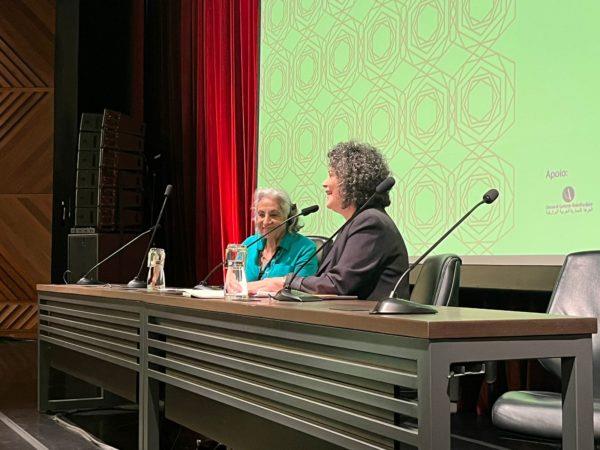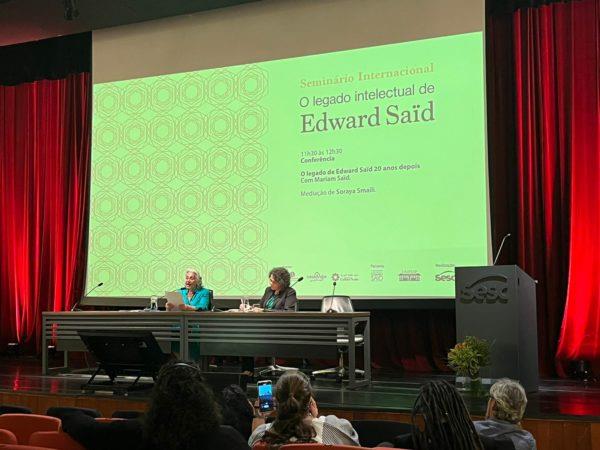
Mariam Saïd Keeps Edward Saïd’S Legacy Alive

São Paulo – Mariam Saïd, activist, writer, and widow of Palestinian scholar Edward Saïd, is in São Paulo and spoke this Tuesday (10) at the seminar The Intellectual Legacy of Edward Saïd , which runs until this Wednesday (11) at the Raul Cortez theater, at SESC 14 Bis. Saïd gave an overview of her husband's life and work, talking about Edward Saïd's work as a professor, published papers and books, new books and projects to come, his love for music, and the question of Palestine. She has been contributing to keeping her husband's legacy alive since his death in 2003.
Born in Beirut, Lebanon, where she lived until her youth, Mariam Saïd met Edward Saïd in New York, United States, in the late 1960s. At the time, he was one of Columbia University's most promising professors and gained tenure at the university at age 34.
“Edward's star began to shine when he wrote an essay in 1970, The Arab Portrayed, originally published in a special edition of the US Journal – The Arab World,” said Mariam Saïd at the seminar.

Saïd (L) and Smaili (R)
In the essay, Edward Saïd discusses representation. Mariam Saïd quoted an excerpt from it.“How the Arab is often represented or, more correctly, misrepresented.”
“This essay was written after the 1967 Arab-Israeli war. Fifty-six years later, a similar situation is happening today, right now. It is very unsettling,” she said.
She said that when they met, Edward Saïd was already“an author, a prolific writer, and an excellent professor who had his work recognized by his peers and superiors.”
Timothy Brennan, Edward Saïd's biographer , worked to organize the author's work before Orientalism in the book Places of Mind: A Life of Edward Saïd, published in 2021.
In 1975, Saïd wrote his first critical thinking book, Beginnings: Intention and Method.
“A few years later, Orientalism , the work that shook the literary world , was published [in 1978],” said Mariam Saïd. Orientalism opened doors for debates and discussion platforms throughout the academic world and is, to this day, his best-known work. The book has already been translated into 36 languages.
“Since then, his career took off, and he continued writing books and accruing awards. All this while he taught full-time at Columbia. He couldn't stop. Maybe he knew his time here wouldn't be long,” said the activist.
The year 2003 marked 25 years of Orientalism, and a special edition was released with a new preface written by the author.“Edward Saïd worked to break down barriers; he was a humanist , and he was not afraid,” said Mariam Saïd.
He received honorary degrees from universities around the world, and in 2003, lymphoma took his life so quickly that Mariam Saïd said she couldn't say goodbye.
In the last decade of his life, he wrote Culture and Imperialism (1993), Out of Place: a Memoir (1999), and The End of the Peace Process: Oslo and After (2000), among other works, and gave interviews and wrote papers.
Mariam Saïd said an archive containing Edward Saïd's collection is at Columbia University and one of the future projects is to digitize all of his work and make it available online to researchers worldwide. There is also a fellowship named after him at Columbia.
Saïd's wife said he always loved music and played the piano , like his mother. According to Mariam Saïd, music is mentioned in his books. Today, she runs renowned music schools bearing his name and the Barenboim-Saïd Foundation, with branches in several countries, such as the United States, Germany, and Spain, as well as a music conservatory in Palestine, with units in Ramallah, Jerusalem, Bethlehem, and Gaza.
“While the fight is going on today, we hope the music institutions resist and that they have a future. I pray for that,” she said. Edward Saïd lived his life cherishing high-quality education and believed in the essence of discipline, perseverance, and focus, according to Mariam Saïd.“He said ' the impossible is easier to achieve than the difficult ,'” she said.
Soon, a book with Saïd's work in music will be published. Another publication will be a book of poems written in his youth.
Mariam Saïd came to Brazil in 2014 when the Cátedra Edward Saïd was founded at the Federal University of São Paulo (Unifesp).
Regarding the Question of Palestine , Mariam Saïd said in the 1970s, Edward Saïd discussed a two-state solution; however, he made other visits to Palestine over the years and, in 1999, published an article in the New York Times Magazine defending the one-state solution.“[He supported] the solution of a single state that recognizes the rights of all its citizens, equal rights, that is equitable, fair, and promotes social justice. This position originates from several reasons. That's why the end of his work is so powerful because he talks about how difficult a two-state solution is, but that you cannot eliminate an entire history, culture, and people,” she declared.

Ambassador Chohfi spoke at the event's opening
Soraya Smaili, former dean of Unifesp and founder of Brazil's Arab Culture Institute (ICArabe), moderated Mariam Saïd's lecture. She recalled“how much we need his work, not only in the political situation but in life. How much his work brings important parallels to the dimensions of human life,” Smaili said. She spoke about Saïd's vast work in different areas, including music.
“Saïd was an intellectual, a scholar who presented solutions based on his work and made available the promotion of equality and social justice,” said Smaili. According to her, SESC-SP will record the entire event and intends, based on the material, to create a new book in partnership with ICArabe .
At the event's opening, also spoke Olgária Matos, coordinator of Unifesp's Cátedra Edward Saïd; Lia Rita, vice dean of Unifesp; Francisco Miraglia, from the School of Mathematics and Statistics of the University of São Paulo (USP); Murched Taha, president of ICArabe; ambassador Osmar Chohfi, president of the Arab Brazilian Chamber of Commerce (ABCC); and João Paulo Leite Guadanucci, representing the São Paulo Social Service for Commerce (SESC-SP).
Chohfi quoted a 1999 speech by Saïd about the conception of the East-West Encounter project with Daniel Barenboim at the opening.“In our work, planning, and discussions, our paramount principle is that separation between people is not a solution to the problems that divide people. Cooperation and coexistence can be done through music, the way we have done and lived. I am optimistic despite the dark skies and the apparent lack of hope at the current moment that concerns us all,” he said.
The ambassador also paraphrased Mariam Saïd, with her consent, retrieving a 2005 speech.“ Keeping his memory is keeping Edward Saïd alive ,” he quoted.
Check out the schedule for the seminar's day two, this Wednesday (11), which will feature a panel with writer Milton Hatoum and professor Dr. Salem Nasser , with the theme“Edward Saïd and the Tragic: Palestine, denial and the Impossible Journey.” The event will be closed by Saïd's daughter, actress, playwright, and activist Najla Saïd .
Translated by Elúsio Brasileiro
Bruna Garcia/ANBA Bruna Garcia/ANBA Bruna Garcia/ANBAThe post Mariam Saïd keeps Edward Saïd's legacy alive appeared first on Agência de Notícias Brasil-Árabe .
.jpg)
Legal Disclaimer:
MENAFN provides the
information “as is” without warranty of any kind. We do not accept
any responsibility or liability for the accuracy, content, images,
videos, licenses, completeness, legality, or reliability of the information
contained in this article. If you have any complaints or copyright
issues related to this article, kindly contact the provider above.


















Comments
No comment